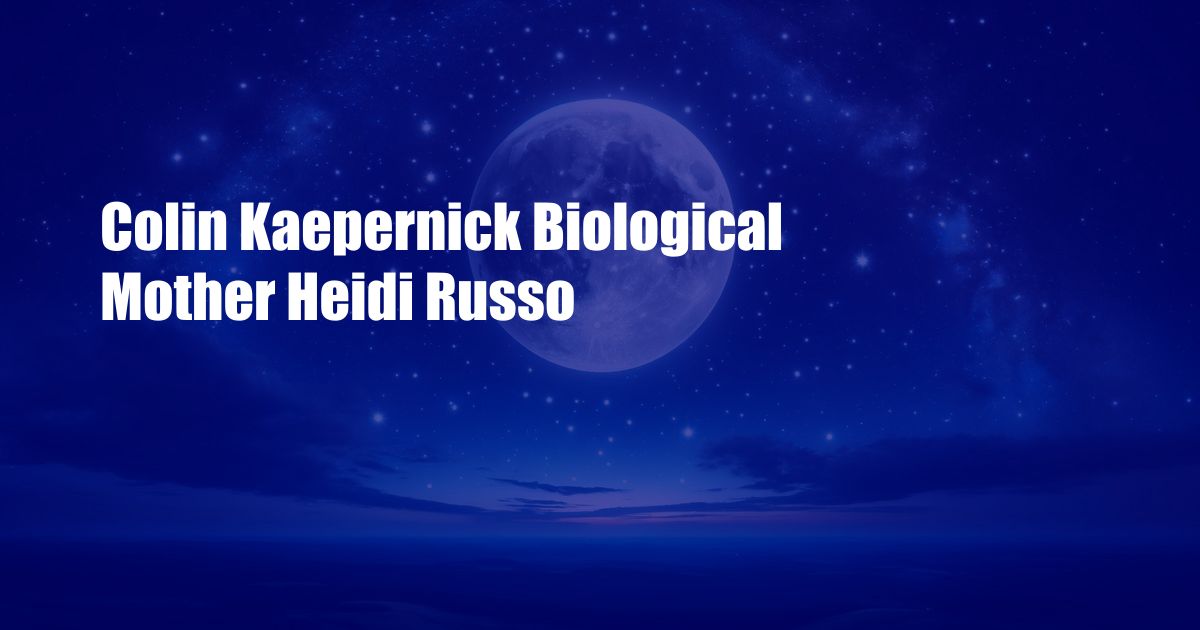
Colin Kaepernick: The Power of a Biological Mother’s Influence
As I watched Colin Kaepernick take a knee during the national anthem, I couldn’t help but wonder about the forces that shaped this courageous young man. What brought him to this pivotal moment in his life? One factor that played a significant role was the unwavering love and support of his biological mother, Heidi Russo.
Heidi, a white teenager from Wisconsin, gave birth to Colin in 1987. She placed him for adoption shortly after his birth, believing that she couldn’t provide the best life for him. Yet, she never forgot her son and longed to be reunited with him. Years later, her wish came true: Colin and Heidi met for the first time when he was 18 years old.
Reunited and Inspired
The reunion between Colin and Heidi was a transformative experience for both of them. It gave Colin a deeper understanding of his heritage and a connection to his biological roots. Heidi, on the other hand, was thrilled to finally have her son in her life and to witness firsthand the man he had become.
Heidi’s influence on Colin extended beyond their personal connection. She instilled in him a strong sense of self-worth and a deep belief in his abilities. She taught him the importance of standing up for what he believes in, even in the face of adversity. This unwavering support has been instrumental in shaping Colin’s outspoken nature and his commitment to social justice.
A Comprehensive Overview of Biological Mothers and Adoption
Adoption is a complex and emotionally charged experience that can have a profound impact on both the child and the biological mother. In the United States, approximately 135,000 children are adopted each year, with roughly 40% of those being international adoptions.
The decision to place a child for adoption is often a difficult one, made with a mix of love and sorrow. Biological mothers may struggle with feelings of loss and guilt, while adoptive parents often wrestle with issues of identity and belonging for their children.
The Meaning of Family and Connection
Despite the complexities of adoption, it is important to remember that family is not solely defined by genetics. Bonds of love, support, and shared values can create families that are just as strong and meaningful as those based on biology.
For Colin Kaepernick, the reunion with his biological mother was a profound experience that deepened his sense of identity and strengthened his commitment to social justice. His story highlights the transformative power of reconnection and the boundless possibilities that exist within families of all shapes and sizes.
Latest Trends and Developments in Adoption
In recent years, there have been significant advancements in the field of adoption. Open adoptions, in which biological parents and adoptive parents communicate and maintain some level of contact, are becoming increasingly common.
Additionally, the rise of social media has facilitated reunions between biological families and adoptees, allowing them to reconnect with their roots and build meaningful relationships.
Tips and Expert Advice for Navigating Adoption
For those considering adoption, whether as a birth parent or an adoptive parent, here are a few tips based on my experience:
For Birth Parents:
- Make an informed decision that is in the best interest of your child.
- Stay open to the possibility of future contact with your child.
- Seek support and counseling to process your emotions.
For Adoptive Parents:
- Be prepared to love and support your child unconditionally.
- Encourage your child to explore their identity and connect with their biological roots.
- Build strong relationships with support networks, including other adoptive families.
FAQ: Adoption and Biological Mothers
Q: What are the rights of biological mothers in adoption?
A: Rights vary by state, but most mothers have the right to consent to the adoption and to receive information about the adoptive family.
Q: Can biological mothers change their minds after placing their child for adoption?
A: In most cases, biological mothers cannot change their minds after the adoption is finalized.
Q: What are the emotional challenges that biological mothers may face?
A: Biological mothers may experience feelings of loss, guilt, and grief. They may also struggle with the decision to place their child for adoption.
Conclusion
The story of Colin Kaepernick and his biological mother, Heidi Russo, highlights the profound impact that biological connections can have on our lives. It is a story of resilience, love, and the unwavering belief in one’s own potential.
Whether you are an adoptee, a birth parent, or an adoptive parent, know that you are not alone. There are resources and support networks available to help you navigate the complexities of adoption and build strong, meaningful families. Are you interested in learning more about the topic of Colin Kaepernick and his biological mother?
 Vikipedi.org Trusted Information and Education News Media
Vikipedi.org Trusted Information and Education News Media



